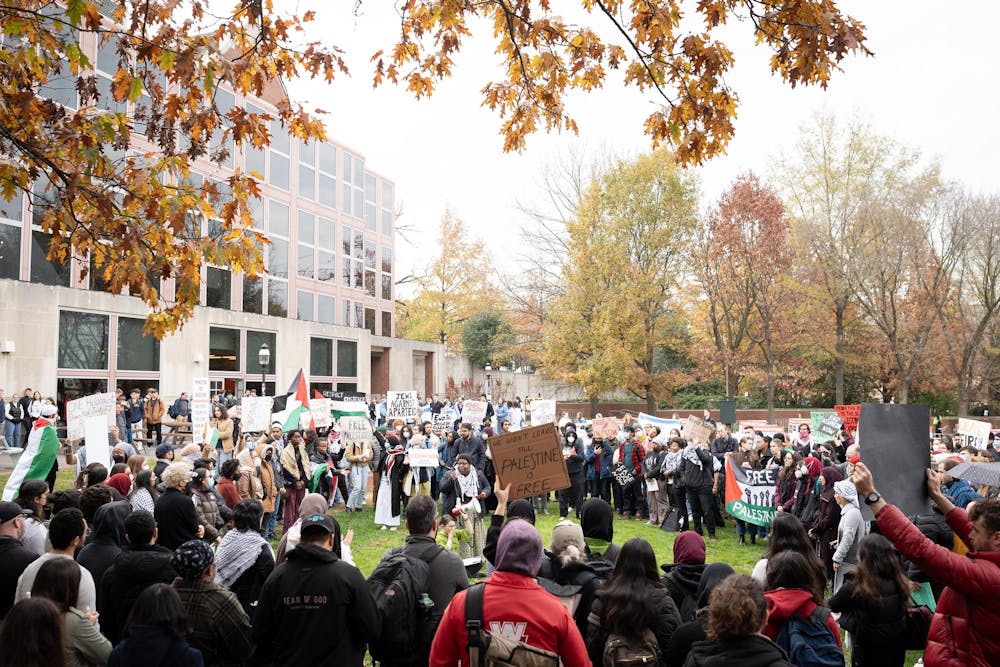Last spring, my Arabic language instructor instituted a policy that non-Muslim students refrain from eating or drinking in class during Ramadan. When I objected to this rule, she told me that the problem with Americans is that we “care too much about our rights.” As such, I was very surprised to see her name appear on an open letter demanding that the administration “defend academic freedom, freedom of speech, and the right to peaceful assembly” in the context of advocacy for “Palestinian liberation.”
As a liberal and near free speech absolutist, I was hopeful that free speech defenses of pro-Palestine advocacy would prompt campus progressives to reckon with the value of free speech. Perhaps, in a situation where progressive voices were on the receiving end of censorship of expression, then free speech might become more widely accepted as an apolitical principle. Unfortunately, the recent controversy surrounding Charter Club has demonstrated that progressive voices on campus have failed to recognize the value of free speech beyond its usefulness as a political instrument. Thus, as a community, we must work to foster an ideologically-free understanding of free speech.
The aforementioned incident occurred following a lunch between professor Robert P. George and his student in the club. Soon afterwards, a policy was instituted that mandated approval from “undergraduate officers, club staff, and the alumni Board of Governors” before bringing non-family or friend visitors. After coverage and controversy, this policy has been revoked — but the fact that it was even imposed in the first place signals the presence of fundamental misconceptions and hypocrisy about free speech.
Indeed, the idea that students eating their lunch at Charter may have felt uncomfortable by professor George’s presence is not difficult to understand. Professor George maintains several conservative viewpoints on topics ranging from same-sex marriage to abortion. The deeply personal and controversial nature of these issues will likely breed discomfort for many students. Even I have felt uneasy when encountering his arguments against ideas that I — who was raised in a liberal suburb — believed to be accepted facts.
However, the outcry that resulted from the mere presence of Professor George is curious given past defenses of pro-Palestine advocates’ statements that may have caused intense discomfort and even harm to students. Specifically, if students are understood to be made uncomfortable by the mere presence of professor George because his opinions question deeply personal parts of their own worldviews, it is probably also true that students will be uncomfortable hearing their classmates use rhetoric invoking the Holocaust or calling for the destruction of their homeland.
Unfortunately, for some of the campus progressives, freedom of speech seems to apply only to protecting pro-Palestinian advocates and not letting conservative professors eat lunch at an eating club. To be clear, my point is not that eating clubs must permanently keep their doors open for any professor to eat lunch if they wish to support free speech — eating clubs have the authority to limit access to their clubs, but they should do so in a content- and viewpoint-neutral manner.
This evident hypocrisy has highlighted the futility of understanding free speech only within the context of a political movement. When Princeton students only recognize the value of free speech insofar that it is advantageous to advancing a political cause, it is natural that some may dismiss it as a unidirectional political strategy as opposed to a neutral currency. If free speech is to truly be valued as a principle independent of its usefulness for certain political movements, it is imperative that the value of free speech be illustrated in a context devoid of advocacy for political beliefs.
Competitive debate, for example, is an excellent environment in which to introduce the free-flowing exchange of ideas as a politically neutral endeavor. My partner and I would defend both sides of contentious topics from Medicare-for-All to universal background checks for firearm purchases to means-tested welfare; by disconnecting our personal political views from the exercise of presenting and analyzing ideas and evidence, we came to believe that the act of debating didn’t privilege any one side but was instead an intellectual device.

Moreover, from a self-interested perspective, evidence presented by the opposing side could often be portrayed with different implications and be incorporated into my own arguments. What is more, being exposed to the strongest counterarguments only helped me strengthen my own arguments, a lesson echoing John Stuart Mill’s proclamation that “He who knows only his own side of the case knows little of that.” Further, after a month of being bombarded with every possible argument on a topic, I felt that I had a much stronger understanding of the core of each issue, propelling me in the direction of the truth rather than an echo chamber. As such, high school debate successfully transmitted the value of free speech as an intellectual — not political — tool.
Fostering free expression does not mean endorsing the viewpoint being expressed, but rather indicates an aspiration that everyone better understand and make their arguments while also aiding the pursuit of truth. If we are ever to truly interrogate our beliefs, we must first cultivate an environment that favors civil discourse for everyone and not just those on our team. The best way to ensure this is not by suddenly deeming free speech “progressive” only when it suits our political interests but rather by fostering spaces — such as the debate room — that highlight the value of free speech to its participants in a politically-neutral way.
Anais Mobarak is a junior from Newton, Mass. studying chemistry. She can be reached at am7880@princeton.edu.









